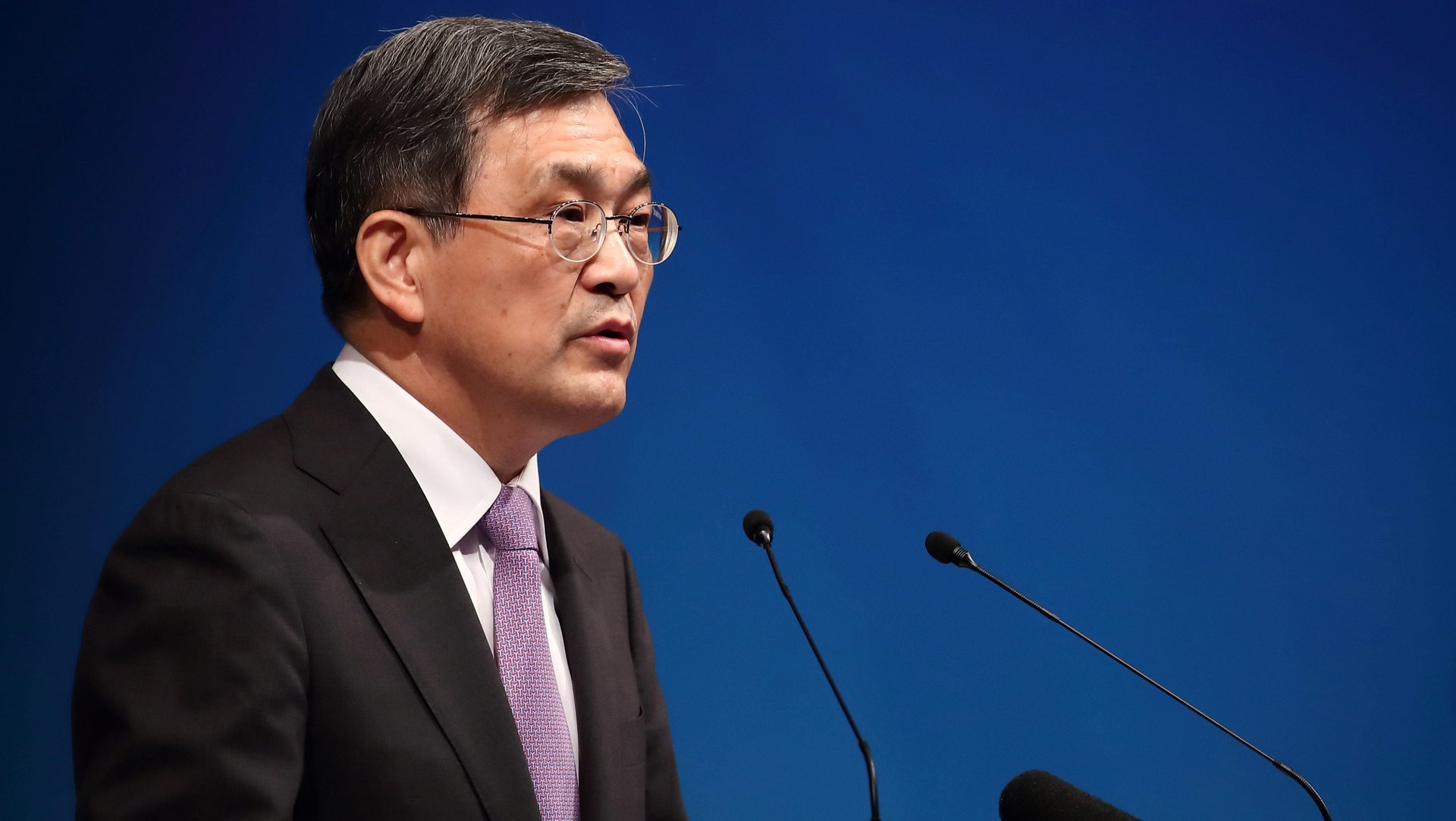Now Samsung actually does have a leadership vacuum
Since the Samsung group’s de facto heir was sentenced to five years in prison for bribery and embezzlement in August, Kwon Oh-hyun, CEO of Samsung Electronics, (shown above) has been the public face of the group’s crown jewel. Turns out, not for much longer.


Since the Samsung group’s de facto heir was sentenced to five years in prison for bribery and embezzlement in August, Kwon Oh-hyun, CEO of Samsung Electronics, (shown above) has been the public face of the group’s crown jewel. Turns out, not for much longer.
Kwon told company employees Friday (Oct. 13) that he would be leaving his role as company CEO, and stepping down as chairman of the board, in March 2018.
“It is something I had been thinking long and hard about for quite some time. It has not been an easy decision, but I feel I can no longer put it off,” Kwon, a three-decade company veteran who started as a semiconductor researcher, told Samsung employees.
To be perfectly accurate, Kwon is one of three CEOs at the company, where the professional managers who run it are not meant to outshine the company’s founding family. Despite being one of three, Kwon is widely regarded as the main leader (pdf). He has been in charge of its memory chip and display businesses, and is credited for the company’s dominance in components, now the key profit driver for the company. Samsung forecast record profit for the third quarter of nearly $13 billion, almost triple that of the same period a year earlier.
Sanjeev Rana, a Korea-based senior technology analyst at CLSA, said Kwon is seen as the “first among equals” of its CEOs, and described the announcement that Kwon will step down when his term ends in March as a surprise not just to industry watchers, but very likely to insiders.
“At a time when Samsung heir apparent and vice chairman Lee was under trial and has been sentenced to five years in prison, everyone was expecting a stable management at the top,” said Rana.
Analyst Park Ju-gun, speaking to Reuters, sharply questioned the move: “The timing is nonsensical. Samsung tipped record earnings, it’s going to be better in the fourth-quarter, and all that’s been driven by Kwon’s components business,” said Park, head of research firm CEO Score.
Samsung has seen more than 12 months of remarkable turmoil, beginning with a product launch last year that turned into a costly recall fiasco. That was followed by becoming entangled in the corruption scandal swirling around president Park Geun-hye, who was impeached in March. Its de facto heir, Lee, has been in a months-long trial that ended Aug. 25 with a guilty verdict over charges of bribing a friend of the impeached president. He was given a five-year prison sentence, which he appealed. Arguments in the appeal hearing began on Oct. 12.
In the meantime, the company has continued to produce stellar profits and even rolled out a new mobile phone. Its stock price has seemed little troubled by the developments and the conventional wisdom was that Kwon’s capable leadership and knowledge of the business was reassuring. On Friday in Asia the stock closed down 1.46%.
Yet one of Kwon’s remarks as he announced his impending departure appeared to be a reference to Lee, 49, who has been expected to assume the Samsung reins ever since his father suffered a heart attack and disappeared from public view.
“As we are confronted with unprecedented crisis inside out, I believe that time has now come for the company start anew, with a new spirit and young leadership to better respond to challenges arising from the rapidly changing IT industry.”
It’s true that the company needs leadership with more software expertise, Rana said, adding that in any case Kwon, in his mid 60s, was nearing typical retirement age for a Samsung executive. It’s also possible, with Lee’s appeal hearing underway, that the company is trying to send a signal.
“He is stressing that Lee is irreplaceable,” said Rana. “He is putting some pressure on the powers that be that Lee needs to be back in Samsung.”